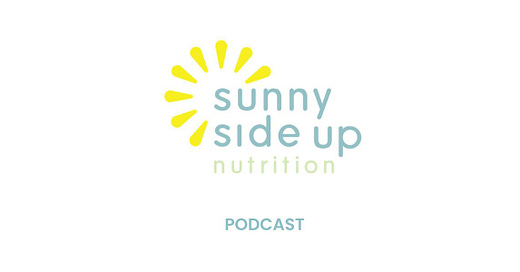Diet culture loves to tell parents exactly how to and how not to feed their kids. What happens often is well-intentioned parents abandon their parenting style(s) and find themselves swinging on a pendulum between permissive feeding practices and urging their kids to “take 3 more bites, or no dessert”! In this latest podcast episode, Anna and I explain how feeding is parenting, how diet-culture creates misalignment, and simple shifts you can make to create calm mealtimes.
Takeaways
Consistency is key: Kids do well when the support and boundaries they experience at bedtime and homework time are also part of mealtimes.
Authoritative feeding vs. short order cooking — Learn how you can shift away from short order cooking.
Learning doesn’t happen all at once- Gradually give tweens and teens planning, prepping, and packing instead of handing over all the responsibilities all at once.
Notice the mismatch — If your food rules feel more harsh, or you find you’ve abandoned any structure, that may be a clue to experiment with a small shift toward a more supportive parenting style.
Resources & Links
Take the Frenzy Out of Feeding – Our 12-module membership that walks you through stress-free family feeding step-by-step.
Instagram – DM us your questions: @sunnysideupnutritionists
Email the show: hello@sunnysideupnutrition.com
Full Transcript
Elizabeth:
Welcome to Sunny Side Up Nutrition a podcast created by three moms striving to bring you evidence-based information to help support you and the children in your life. Your hosts are Anna Lutz and me Elizabeth Davenport, both registered dietitians, and Anna Mackay, a dietitian-to-be and certified personal trainer. Anna Lutz co-owns Lutz, Alexander & Associates Nutrition Therapy in Raleigh, North Carolina, and I co-own Pinney Davenport Nutrition in the D.C. metro area. Anna Mackay is in the process of completing her dietetic internship. Just a note that this podcast is for informational and educational purposes only. Thanks for being here.
Elizabeth: Hi, Anna. It's so exciting to be here again recording our now third episode back into podcasting.
Anna:Yeah.
Elizabeth: So, today we are going to talk about what we mean when we say feeding is parenting. It's easy to think of mealtime struggles as separate from how we parent, but the truth is they're very interconnected. Diet culture often pulls us out of alignment with the kind of parents we want to be, so today Anna and I are going to chat about how to identify what's working, what's not, and what small shifts you can make to reduce the stress around feeding as parenting.
Anna: Absolutely—that was great!
Anna:
One of the things we say a lot is feeding is parenting. So let's unpack that, because listeners may be thinking, what in the world are you talking about? We can also share examples of how diet culture interferes in parenting.
Anna:
In the introduction you said it so well: the messages parents get about how to feed children can push us to feed in a way that’s completely different from the style of parenting we use for everything else. Someone who’s normally supportive and structured—bedtime, homework, learning new skills—might suddenly feed in an authoritarian way because diet culture is very good/bad, right/wrong. That misalignment creates anxiety.
Elizabeth:
Yes! The parent might wonder, Wait, this isn’t what I believe—why am I doing this around food? And all the online feeding advice may not align with how they actually parent, so they’re left questioning whether they’re doing a good job. It’s a lot to navigate.
Anna:
Exactly. For example, telling a child, “You must eat all your broccoli before dessert.” That’s an authoritarian rule. Yet in other areas this same parent may be collaborative and supportive—like helping a shy child ease into a birthday party instead of forcing them inside. If we step back and apply that supportive style to food, we’d offer the broccoli, let the child decide to smell it, taste it, or not, and trust that over time they’ll learn to eat it without the hammer coming down.
Elizabeth:
Makes total sense. Listeners, send us questions if anything feels unclear! Another place diet culture collides with parenting is the pressure to give tweens and teens full responsibility for their food—packing lunches, making dinner—without any structure. Kids are still growing and busy; they need scaffolding.
Tweens, Teens, and Scaffolding
Anna:
Feeding oneself is a developmental task. We want kids to leave home able to feed themselves well, but we can’t yank away all support in fifth or sixth grade. Instead we build autonomy gradually:
Elementary: You plate the snack, or give two choices.
Middle school: They prepare the snack; you nudge balance (“grab a fruit with that granola bar”).
High school: They pack their own food, but you ask, “What’s your plan for snack before soccer?” and check that they actually have one.
Elizabeth: And every child develops at their own pace. Some high-school seniors still benefit from a packed lunch. I make my senior’s lunch because her schedule is packed. She sees what I pack, makes her own lunches on weekends, and will be fine in college.
Anna: Exactly. Bottom line: “no lunch” isn’t an option. If the parent truly can’t help in the morning, brainstorm a Plan B—school lunch, or pre-packed foods like Uncrustables, chips, fruit, yogurt—so a balanced meal is always there.
Short-Order Cooking & Parenting Styles
Elizabeth: Another common pitfall is short-order cooking—making a separate meal when a child refuses dinner.
Anna: Right. That’s permissive feeding. The child misses exposure to new foods and struggles later at a friend’s house or the college dining hall.
Anna:
Think of the parenting-style continuum:
Authoritarian: “Clean your plate or no dessert.”
Permissive: “Fine, I’ll make mac & cheese instead.”
Authoritative (goal): Structure and flexibility—serve one family meal with at least one familiar food, no pressure to clean plates.
Ask yourself: Where am I now? What small step nudges me toward authoritative? Maybe you stop short-order cooking by ensuring a preferred side dish is on the table; over time you can phase that backup out.
Elizabeth: And sometimes you will make the alternate meal—life happens—just aim for the overall pattern to support skill-building.
Wrapping Up
Anna: Notice any misalignment between your overall parenting style and feeding approach, then take one small step toward alignment. We’d love your questions—DM us on Instagram, comment on Substack, or email hello@sunnysideupnutrition.com.
Elizabeth: Thanks for listening, and until next time!
Anna: Bye.
Anna: Thank you for listening. If you enjoyed this episode, please rate it and write us a review wherever you listen. Go to Sunny Side Up Nutrition Podcast in your podcast app and scroll down to the stars. Also, we’d love for you to join our 12-module membership Take the Frenzy Out of Feeding. Visit sunnysideupnutrition.com and look for the Membership tab to join today.











Share this post